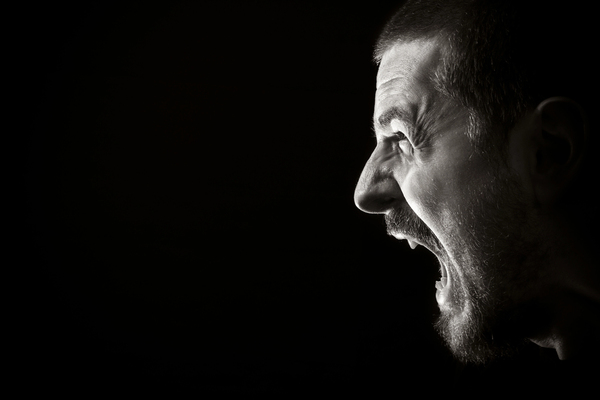Bipolar disorder is a mental health condition in which the individual suffering from it experiences episodes of intense mood swings. During mania or a manic episode, the person experiences:
- Elevated mood
- High energy
- Inflated self-esteem
- High distractibility
- Agitation and irritability
- Impulsivity
- Lack of sleep
In this state, they’re likely to engage in aggressive and risky behaviors. Their emotions and invincibility consume them so thoroughly that they fail to consider the consequences of their actions.
During depression or a depressive episode, they experience:
- Low mood
- Low energy
- Anhedonia
- Hopelessness
- Sadness
- Isolation and withdrawal
- Thoughts of self-harm
In this state, they behave like a person suffering from depression would. They lose interest in doing the things they were previously interested in. Even small, routine activities feel burdensome as they become caught in the downward spiral of sadness and hopelessness.
Bipolar rage towards partner and others
Bipolar anger, aptly called bipolar rage, is not the anger you see in a normal person whose boundaries have been violated or rights stepped on. It is sudden, intense, and irrational. It’s triggered by minor events that wouldn’t bother most people, not even bipolar people when they’re not experiencing an episode.1Fast, J. A., & Preston, J. (2012). Loving someone with bipolar disorder: understanding and helping your partner. New Harbinger Publications.
Because a bipolar person is impulsive, especially during a manic episode, a slight shift in their mood may lead them to escalate things and unleash the wrath of their bipolar rage on those around them. Because a married bipolar person spends most of their time with their spouse, the latter is the major victim of bipolar rage.
While bipolar rage in the manic episode may be likely to lead to aggressive behavior and violence, it can also occur in the depressive episode. Because of the low energy in the depressive phase, the risk of physical aggression may not be that high. Consistent with this, researchers have found that violence, in particular, is a significant worry of the partners of those with bipolar disorder during mania.2Dore, G., & Romans, S. E. (2001). Impact of bipolar affective disorder on family and partners. Journal of affective disorders, 67(1-3), 147-158.
Impact on marriage/partnership
Anger can be the destroyer of any relationship, and one can only imagine how destructive, unreasonable, and intense anger can be. Bipolar marriages tend to have high rates of volatility and divorce.3Granek, L., Danan, D., Bersudsky, Y., & Osher, Y. (2016). Living with bipolar disorder: the impact on patients, spouses, and their marital relationship. Bipolar disorders, 18(2), 192-199.
The partners of those with bipolar disorder experience:
- High stress levels4Casarez, R. L., Barlow, E., Iyengar, S. M., Soares, J. C., & Meyer, T. D. (2019). Understanding the role of m-Health to improve well-being in spouses of patients with bipolar disorder. Journal of affective disorders, 250, 391-396.
- Anxiety
- Resentment
- Loneliness
- Feeling stuck
- Feeling hurt
- Feeling overwhelmed
- Feeling burnt out and burdened5Azorin, J. M., Lefrere, A., & Belzeaux, R. (2021). The impact of bipolar disorder on couple functioning: implications for care and treatment. A systematic review. Medicina, 57(8), 771.
Dealing with seemingly random, intense, and unreasonable mood swings can be highly emotionally draining. When under the grip of bipolar rage, the person with bipolar disorder can’t see reason or reality. They feel anger, are unable to control it, and then find someone or something to blame for their anger, usually their spouse.6Eisner, L. R., & Johnson, S. L. (2008). An acceptance-based psychoeducation intervention to reduce expressed emotion in relatives of bipolar patients. Behavior therapy, 39(4), 375-385.
During such heated moments, it’s pointless to argue with your bipolar partner. When their mood shifts, they enter this ready-to-blame mode, and anything you say or do will be used against you. Any counter-blaming will add fuel to their bipolar fire.
Coping strategies
If you didn’t know anything about bipolar disorder, you probably wasted a lot of time trying to understand and argue with your partner. Now that you know what it is and what bipolar rage is, you’re in a better position to deal with your bipolar partner.
The key is to remember that when they’re under the grips of bipolar rage, they’re not being themselves. It’s the disorder speaking and doing. This separation of the person from the disorder is crucial.7Speirs, B., Hanstock, T. L., & Kay-Lambkin, F. J. (2023). The lived experience of caring for someone with bipolar disorder: A qualitative study. PloS one, 18(1), e0280059.
If you don’t react and counter-blame, this phase will end soon, and they’ll be back to their usual loving and affectionate self as if nothing happened. While this might have previously caused great confusion, you should now be able to deal with it in a much more patient and detached manner.
When their bipolar rage episode subsides, tell them kindly and patiently that they were behaving abnormally and might need help. Tell them how their behavior affects you. If you know some triggers that unleash their bipolar rage, avoid them. Make a plan of action about what you’ll do the next time they get angry.
- What will you do to calm them?
- What mindsets will help you avoid reacting?
- How and when will you exit the interaction?

